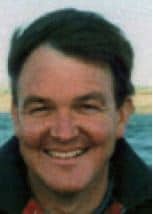Paul Tolfree was born in Guildford in 1955 and spent his childhood in Cornwall and Gloucestershire.

He was educated at Bryanston during which time he developed an interest in multi-sports through the Pony Club.
He initially played polo and then took up tetrathlon, which involves riding, swimming, running and shooting and promptly went on to win the National Individual Championships.
He then moved up to modern pentathlon, which also included fencing. He was very successful at this and won the National Championships in 1972 and 1974.
As a result, he achieved a place in the British Junior Modern Pentathlon team and competed at his first World Championships in Russia in 1974.
Paul was awarded an Army Scholarship and was commissioned into the Queen’s Own Hussars in 1975 with whom he served until 1992.
His wise choice of regiment was influenced by his great-uncle, Brig Philip Kelly, who had commanded the 3rd Hussars and had been the Colonel of the Regiment.
During his early years with the Regiment he continued his success as a pentathlete, now at international level. He won an individual bronze medal for shooting in the 1976 Junior World Championships in Poland. This was all the more remarkable as his pistol had malfunctioned and he had had to borrow one from another competitor.
He was a member of the winning Junior GB team in Jonkoping and came fifth as an individual. However he was finding it extremely difficult to be a full time officer while still training at international level.
As a result he gave up his pentathlon, returned to the Regiment in Germany, and was instantly recruited into the Langlauf Biathlon team, this entailed running up hills on skis and shooting. Paul loved it and he competed at the Army and World Championships and subsequently went on to be the manager of the British Olympic Biathlon ski team in Sarajevo in 1984.
In 1977 he was posted to Pomeroy Police station as part of the Regimental deployment to Northern Ireland. During the summer he could be seen doing his Langlauf winter training by skiing on road-skis through the Irish lanes protected by Land Rovers front and rear. An extraordinary sight and one which epitomised his commitment and sense of fun.
Two years later, while serving in Belfast with ‘A’ Squadron QOH, the sounds of rifle shots were heard very close to our barracks. There was an understandable, sense of urgency and concern. A few moments later Paul and his patrol drove into camp at some speed, and he commented calmly – ‘I think someone was just shooting at us’. In the meantime the Squadron was deploying all its forces to find the perpetrator. Paul’s understated comment epitomised his relaxed approach to life, which many will have witnessed over the years.
In the early 80s he was posted as an instructor to the Driving and Maintenance School in Bovington, where he had plenty of time to master the new sport of windsurfing.
There followed a life of Regimental service in Berlin with ‘D’ Squadron, Hohne as ‘B’ Squadron Leader during the fall of the Berlin Wall and the end of the Cold War, and Cyprus where he was responsible for the adventure training of the Regiment during its tour in Dhekelia.
One of his ex Squadron Leaders wrote: ‘Maj Paul Tolfree was an outstanding officer, keen, bright brave, resourceful and above all else good company. His soldiers loved him’.
Shortly after amalgamation in 1992, Paul left the Army and settled in Dorset. He started his second career as a financial advisor and became the managing director of Savoy Financial Planning in Shaftesbury.
He had a wonderful knack of empowering people, to not only invest their financial resources, but also to fulfil their dreams.
He continued to enjoy new challenges and in 2002 he climbed to the summit of Mount Kilimanjaro, and in 2005 learned the dangerous sport of paragliding in Cyprus. He was a keen yachtsman and spent much of his time tinkering on boats or sailing the Channel.
Paul died on 29 July 2006 after a long battle with cancer at the age of 51.


